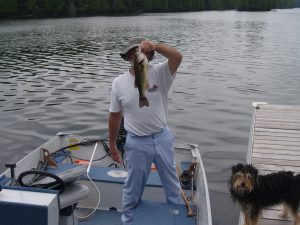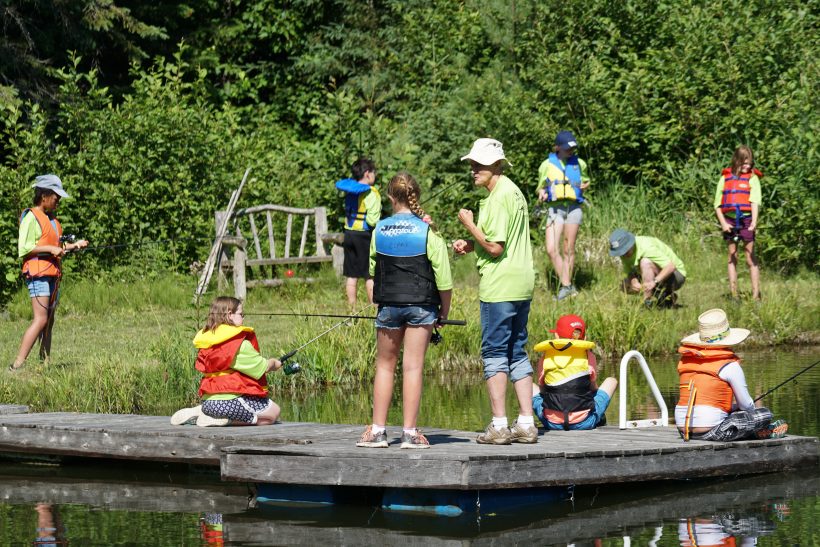The year of 1975 will be remembered by many as the year we did not have any real spring in East Parry Sound. It was cold, ice very slow and late in going, and then a heat wave, hotter than we have had most of the last quarter century of summers. Now, and this is for a couple of weeks, the leaves are all out, the flowers are mostly gone, the creeks in the woods are drying up, and this while May still has a week to run. One only has to be outside a short while to find out that the blackflies are numerous and hungry. Think this is the first spring I can remember that we had a full crop of blackflies before the mosquitoes came on the scene.
It is not fair to judge 1975 with other springs, for the weather has been so unusual. Then, the very heavy demands made on our lakes the past fifteen years have so depleted our lakes that again one should not compare the present success with the results of fishing in those same lakes years ago.
The first fishing I did in Algonquin Park was in 1912. This was with a hand line, a long length of cotton line, cuddy hunk I think it was called, and perhaps a quarter pound of lead for sinkers. This would be in several large sinkers. The test of skill was to bring in a fish and not have the line all tangled when you tried to put it out again. Most of the fishing was done with an archer spinner as lure. There were some copper spoons used, and perhaps the most popular lure was the old muskie bait. A quite large spinner, same type as a June bug, with a set of feathered hooks. This bait appeared under many names, with some modifications, and with many sizes. It was used by campers as their main bait for lake trout, speckled trout, and black bass. It was also used for pike, pickerel and muskie. Wonder what the fishermen of half a century ago would say if they could see the amount of various types of lures that are used by the present day fishermen.
Copper line became popular about the time of the first war. I wish I had kept one of the earlier makes of reels for this type of line. It sank down to where the fish were and was much easier to handle.
Following the popular archer spinner was the Williams W

abbler in the early thirties and right away it was a hit. Many similar baits are now available and almost every fisherman has his own choice. The archer spinner required a minnow which meant extra work hunting minnows when on a trip. Too, it meant looking at the bait after every strike, as there were nine hooks, and those attached to the minnow came loose easily. Later it became popular to use a piece of minnow on almost every lure.
In the really cold lakes the fish do not come to the surface soon as the ice is gone, as they do in most lakes. It was many years before we found out that they could be caught still fishing with minnows, and right on the bottom, even at times in more than seventy feet of water. Odd, to be on one lake fishing with light tackle right on the surface, or close to it, and then the next lake be still fishing deep. Still fishing was good on some lakes during the warm weather in the summer. There were more fish in the lakes than there are now. We were told many times that a rod and line, or many of them, could not deplete a lake. Too, were told by people who made studies that an acre of water would only support a certain number of fish. Yet we knew of lakes that produced many times the suggested number of fish until the limit was reached. Now we are paying for simply too heavy fishing. Recently there have been reports that the little glacial lakes did not have the capacity to produce enough food for many fish. Our lakes are getting a little poorer each year.
Fortunately times are changing and to most of the people who go into the woods think mostly of being on clean lakes with fresh air and sunshine, and catching fish is only secondary. Perhaps it is better explained in a paragraph written by Robert Burton over three centuries ago: “Fishing is still and quiet: and if it so be the angler catch no fish, yet he hath a wholesome walk by the Brookside, pleasant shade by the sweet silver streams; he hath good air, and sweet smells of fine fresh meadow flowers; he hears the melodious harmony of birds.”
Mr. Burton is, of course, quite right. But then there are so many who now and again would also like included even enough fish to make a smell in the fry pan.
